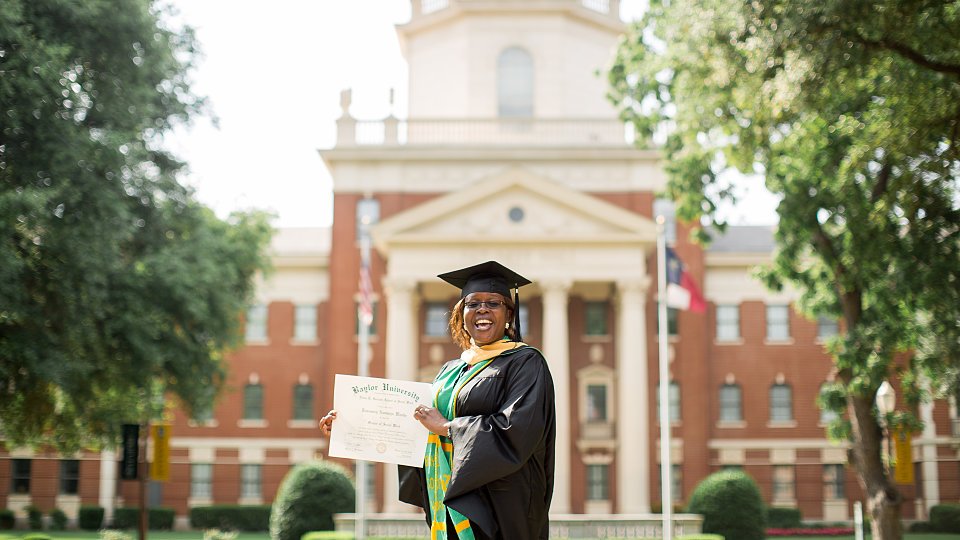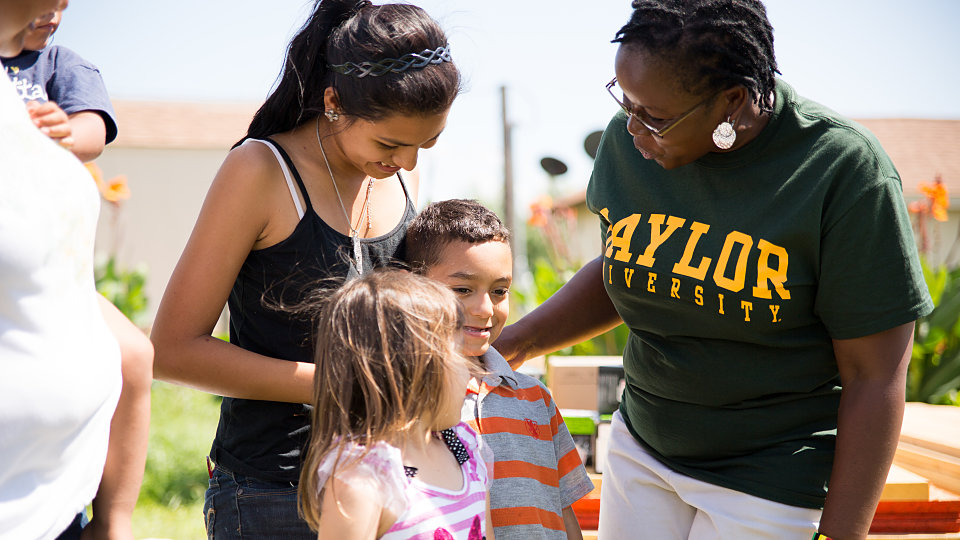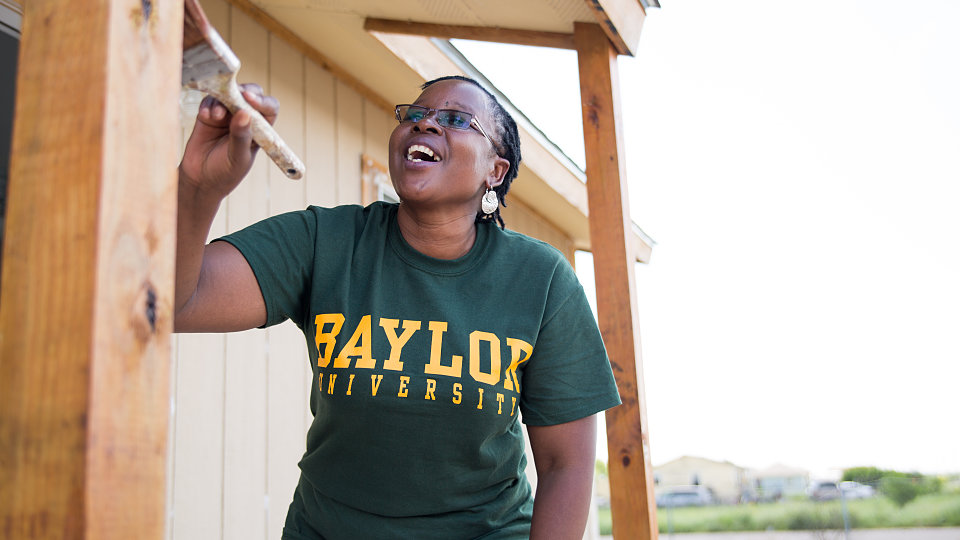'My greatest burden'
When asked why she works so hard for orphans and children in poverty, the normally upbeat Rose Wasike pauses solemnly as tears fill her eyes.
“My parents were very poor,” she says slowly. “I was the third child out of 11 so growing up I saw the problem and the power of poverty. My parents used to struggle a lot to put food on the table, and just even to take us to school.”
She wipes her eyes and apologizes. Poverty makes her emotional.
Wasike’s parents were determined to help her go to school, even though some of her siblings dropped out to work and earn money for the family.
“My parents were struggling in order to pay my school fees,” Wasike says. “My father was a peasant farmer, and every time he’d grow corn or beans he would save everything. Sometimes after selling all the products, all the money that was saved out of that product was all given to me.”
The emphasis on education and the sacrifice her parents made for her to go to school motivated her to excel. It also revealed poverty as a power that need to be conquered.
Wasike completed high school and college with a degree in education. After graduation, she taught high school in Kenya. She wanted to provide not only for herself but for her parents as well.
“During my time as a teacher, one thing I realized is I was in the same cycle of admitting students who were also struggling with poverty,” she says. “They had to pay school fees to be in school, but some of them – a large majority of them – did not have the ability to do that.”
As a teacher, Wasike was now part of the system sending children home for not having school fees. It broke her heart and stirred up the same feelings of doubt and insecurity from when she was younger, leaving school and hoping her family would have the money to pay the fees.
“It made me recall through my youthful life when I was also in the same situation where teachers were sending me home to go get school fees,” Wasike says. “It was like, ‘OK, I’m going home, yes, but are there school fees at home?’”
For Wasike, that meant poverty was not only within her family but rather spread throughout the community where she grew up and even later when she started working. The brokenness in the system didn’t bring her fulfillment in her work as a teacher because she couldn’t help the children she had come to love so dearly.
“I would always hide my feelings to tell them, go home and look for school fees,” Wasike says.
When her husband was offered a scholarship to study in the United States, Wasike quit her teaching job and moved her family abroad.
When they moved back to Kenya, Wasike found Buckner. The ministry was seeking a volunteer to begin a program in Busia, one of the rural centers of Kenya near the Ugandan border. She started as a mentor, but later began working as a social worker, recruiting children into the program and giving them an opportunity to go to school. She was influential in starting Buckner programs in Busia. Wasike loved her work with Buckner and found it a natural fit for her skills and passion. Two years later, she moved to Kitale, a slightly larger area in Kenya, where she continued her work with vulnerable children and impoverished families and established a foster care/ kinship care program for Buckner.
In 2012, Buckner Country Director Dickson Masidano asked Wasike if she was interested in moving to the U.S. to attend Baylor Univer- sity in Waco, Texas, to study social work and earn a master’s degree. Among other requirements, the candidate needed to have worked for Buckner for more than five years and be committed to working with children and families in poverty. Dickson knew Wasike fit the bill perfectly.
“We knew Rose had the commitment to complete the program,” Dickson says. “One of the warnings is that Baylor is very rigorous; you need to be very hard-working. We knew Rose is hard-working when she commits to something. She gives it all.”
“I was very excited when I found out I was accepted,” Wasike says. “I went down on my knees and told God, ‘Thank you that you’ve remembered me. The reason why you’ve chosen me, I don’t know but one thing I know is that you have a reason for it and you are sending me there because there’s a mission ahead of me you want me to do.’”
Wasike moved to Waco to begin her degree in Baylor University’s Global Mission Leadership program with a special emphasis in child poverty.
She worked hard on her coursework and finished in May 2015. It’s clear Wasike loves Baylor – she has T-shirts in almost every color and wears them with pride. The day of graduation, she was filled with pride and constantly smiled. Two years of hard work had finally paid off.
Before returning to Kenya, Wasike visited Buckner programs in the Rio Grande Valley to shadow staff and see practical ways to implement what she learned at Baylor with real families.
Buckner staff thought that since issues faced by families in the Rio Grande Valley were similar to Kenya, and because they have such a strong Family Hope Center model, Wasike could learn a lot and implement it once she went back to Kenya.
“One thing I’ve seen that is similar is the aspect of poverty,” Wasike says. “In Kenya, poverty is at a very high level. Out of our population of about 46 million, about 38 million people are living under the poverty line, and poverty is on a very high level like the Rio Grande Valley.”
Wasike spent four days shadowing Buckner staff along the U.S. border. She visited families, saw home builds in progress and saw first-hand the effective model of family coaching used to bring families to self-sufficiency.
“Social work is a service to others,” Wasike explains. “Social work basically involves you putting yourself out there to work with individuals and improve their wellbeing, and also it involves the relationship building, which is critical, building rapport with people that you are going to work with so that you can help them.”
Ten days after graduation, Waiske finally traveled home to Kenya. The best part of the day-long journey from Texas to Kenya was meeting her husband and daughter at the airport. Hugging them was like a big sigh of relief.
Now that she’s back in Kenya, Wasike is responsible for implementing the Buckner Family Hope Center model of coaching families to self-sufficiency.
“Greater than her compassion for people, is her passion to know, encourage and allow people to change themselves through finding purpose in this life through Christ Jesus, personal drive and determination,” says Phil Brinkmeyer, Buckner senior director of international operations. “Rose is driven by the cause of Christ as she helps others work toward their own drive. Anyone who meets Rose sees Christ through her sweet spirit, quiet resolve and her glimmering smile.”
Wasike is so dedicated to helping Kenyan children she has taken in a young boy who doesn’t have any living parents as one of her own. She refused the typical kinship stipend from Buckner; she simply wanted the boy to have a safe, loving place to live.
“As a person, Rose is very hard-working and pays attention to details,” Masindano says. “She loves her job but she goes above and beyond her work, like the young man she took in. She was so attached to him.”
Masindano says Wasike has free reign to develop the Family Hope Center model in Kenya, mostly because she has already been successful in implementing other programs like kinship/ foster care and an economic empowerment program known as community banking.
“Even before Rose left for Baylor, one of her strengths was that she managed to bring families together,” Masindano says. “She developed programs that grew really fast, and we’ve had some graduates, meaning people who no longer need our support. Rose has been very, very instrumental in that.”







